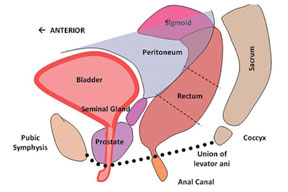
 In NYC MSM with rectal bacterial infection, 1 in 15 gets HIV yearly
In NYC MSM with rectal bacterial infection, 1 in 15 gets HIV yearly
Written by Mark Mascolini on behalf of the International AIDS Society
One in 15 New York City men who have sex with men (MSM) with rectal chlamydia or gonorrhea got diagnosed with HIV infection within a year. In contrast, only 1 in 40 MSM seen at the same sexually transmitted infection (STI) clinics but without rectal chlamydia or gonorrhea got diagnosed with HIV. Bacterial rectal infections indicate risk behavior that could facilitate rectal HIV acquisition in people who have receptive anal sex.
To clarify the impact of rectal infections on HIV incidence, researchers studied HIV-negative MSM attending New York City STI clinics who did or did not get diagnosed with rectal Chlamydia trachomatis or rectal Neisseria gonorrhoeae from January 2008 through March 2010. During follow-up, the researchers determined how many men in each group got diagnosed with HIV.
Among 276 HIV-negative MSM diagnosed with rectal chlamydia or gonorrhea, 31 (11.2%) got diagnosed with HIV, including 14 (45% of 31) diagnosed by clinicians outside the STI clinic. Among 276 HIV-negative MSM attending the same STI clinics and not diagnosed with rectal chlamydia or gonorrhea, 12 (4.3%) got diagnosed with HIV during follow-up.
Annual HIV incidence measured 6.67% (95% confidence interval [CI] 4.61% to 9.35%) in the group with rectal bacterial infection and 2.53% (95% CI 1.31% to 4.42%) in the group without rectal infection (P = 0.0032). More than 70% of rectal infections were asymptomatic and would not have been diagnosed without testing.
In univariate analysis, black race was the only factor associated with increased risk of HIV in men with rectal bacterial infection, raising the risk 5 times (hazard ratio 4.98, 95% CI 1.75 to 14.17).
“Identifying and treating rectal infections may reduce HIV incidence,” the researchers propose, because “rectal sexually transmitted diseases increase biological susceptibility to HIV infection through epithelial erosions and alteration of host immune defenses.”
Also, because rectal infections are markers of behavioral risk, they “can be used to identify a subset of patients who may benefit from intensive risk reduction counseling and other interventions designed to reduce the risk of HIV transmission.”
Source: Preeti Pathela, Sarah L. Braunstein, Susan Blank, Julia A. Schillinger. HIV incidence among men with and those without sexually transmitted rectal infections: estimates from matching against an HIV case registry. Clinical Infectious Diseases. 2013; 57: 1203-1209.


Be the first to comment